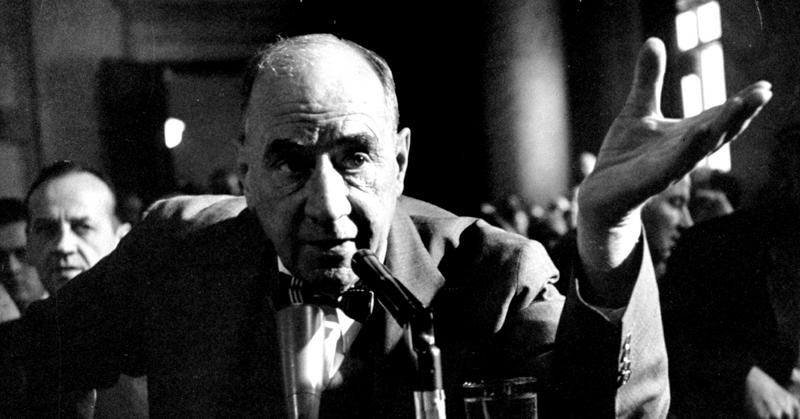'Have You No Sense Of Decency?' When Joseph Welch Owned Joe McCarthy in 1954
By | June 7, 2020

In 1954, Joseph Welch took on Senator Joseph McCarthy -- and won. With just a few clear words, Welch gave voice to growing anti-McCarthy sentiment. McCarthy, who'd risen to prominence with an anti-communist "witch hunt" that became known as McCarthyism, had trained his eye on the U.S. Army. In hearings known as the Army-McCarthy hearings, the Senator continued his usual scare-mongering, career-wrecking accusations, and Welch, the Army's chief legal representative, was fed up. "Have you no sense of decency, sir?" Welch asked. "At long last, have you left no sense of decency?"
Conditions Were Ideal For A Demagogue Like Joseph McCarthy

Whether it was ancient Rome in 400 B.C or today, politics remains an ugly business. The intrigue of power, wealth, and fame attracts all manner of people and, unfortunately, they rarely rank as our best, brightest, or even morally principled. Senator Joseph McCarthy’s legacy remains an embarrassing reminder of how high a morally bankrupt and self-serving person can rise before karma steps in. At least we can look to Joseph Welch and his declaration of “Have you no sense of decency?” and hope that there will always be a course correction when politics fly off the rails.
McCarthyism’s Rise

Prior to 1950, Joseph R. McCarthy was unknown to most of America. In the early days of the Cold War, he announced, with little evidence, that hundreds of communists had successfully infiltrated the State Department and other integral agencies. He fanned the flames of fear -- communist infiltrators were seen by many Americans as an imminent threat. Today, it’s difficult to describe the fears of communism that racked America but in the ‘50s, nothing terrified Americans more than the “Red Scare.”
Using Fear To Gain Power

McCarthy knew America’s dread of communism well and used it as a tool to gain power. Any opponents of his were labeled Communists or “egg-sucking liberals.” If McCarthy’s motives or methods were questioned, he responded with bombast and insults, “Communists and queers … have the American people in a hypnotic trance.” According to McCarthy, he was a “real man” while his opponents were weak and lax on national security.
Playing The Media

The media also played a role in McCarthy’s rise. Five months after his famous anti-communist speech, he was on the cover of Newsweek and Time, as well as the cover of many other publications. He was good for the newspapers. “He was bizarre, unpredictable, entertaining, and always newsworthy,” said historian David Oshinksy.
And when a news organization like Time attempted to paint the real picture of McCarthy, he retaliated by “writing letters to corporations telling them that Time was “pro-communist” and asking whether they wanted to do business with such a publication.” Throwing out accusations of communism was his favorite way to keep his name in the headlines.
McCarthy’s Critical Mistake

As things do, the tide began to turn against McCarthy in 1954. Republican Dwight Eisenhower became President. And while McCarthy’s rantings of communists in government played well while Democratic President Truman was in power, it became a political problem for the Republican party under Eisenhower. Eisenhower had also decided how to deal with McCarthy. “I had made up my mind how I was going to handle McCarthy. This was to ignore him. … I would give him no satisfaction. I’d never defend anything. I don’t care what he called me, or mentioned, or put in the papers. I’d just ignore him.”
'Have You Left No Sense Of Decency?'

Under the weight of his failing popularity, McCarthy made a crucial error. He went after the U.S Army. He called the Army “soft” on communism and as the chairman of the Government Operations Committee in the Senate he began televised hearings on their perceived weakness. Unfortunately, for McCarthy “up to twenty million people watched McCarthy bully, evade, attack, and lie.”
If that wasn’t enough, McCarthy went to his old faithful playbook and accused one of the Army’s lawyers of having a connection with the Communist party. The Army’s lawyer Joseph Welch then responded with the line that effectively ended McCarthy’s career and not long after, his life. “I beg your pardon. Let us not assassinate this lad further, Senator. You've done enough. Have you no sense of decency, sir? At long last, have you left no sense of decency?” That exchange along with McCarthy’s declining power put an end to his witch hunt. Three years later he died of complications from cirrhosis of the liver.
